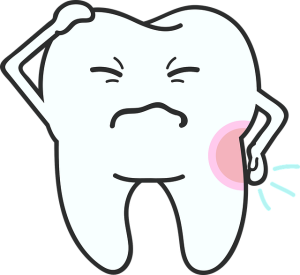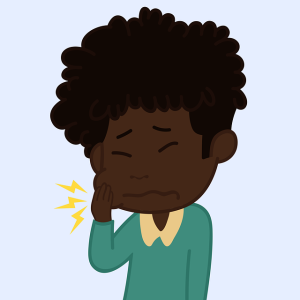What causes tooth sensitivity?
 Sensitive teeth can make daily life difficult. You might experience tooth pain when eating cold or hot food, or even when your teeth meet cold air. Awareness of sensitive teeth has risen in the last 10 years, thanks to a certain toothpaste brand’s advertising, but did you know you can get sensitivity for a whole range of reasons?
Sensitive teeth can make daily life difficult. You might experience tooth pain when eating cold or hot food, or even when your teeth meet cold air. Awareness of sensitive teeth has risen in the last 10 years, thanks to a certain toothpaste brand’s advertising, but did you know you can get sensitivity for a whole range of reasons?
Medicated toothpaste may not be the best solution for everyone’s tooth pain. At Streatfield Dentists, we try to get to the root of the problem before suggesting solutions. Here are some reasons why your teeth might be suddenly sensitive, as well as information about sensitive teeth in general.
About Tooth Sensitivity
 The feeling we get from tooth sensitivity is different from cavity pain. Tooth sensitivity pain is a temporary sharp nerve pain which occurs in response to temperature or sugar. Triggers can be hot, cold, sweet, or sour, and you may feel it in one or several teeth.You may be able to identify this pain as felt in particular areas of the tooth or teeth, such as the flat faces or at the gum line. This can help indicate the cause of tooth sensitivity.
The feeling we get from tooth sensitivity is different from cavity pain. Tooth sensitivity pain is a temporary sharp nerve pain which occurs in response to temperature or sugar. Triggers can be hot, cold, sweet, or sour, and you may feel it in one or several teeth.You may be able to identify this pain as felt in particular areas of the tooth or teeth, such as the flat faces or at the gum line. This can help indicate the cause of tooth sensitivity.
Each tooth has a number of nerves inside, which helps us judge the hardness and temperature of things we bite and alerts us to possible damage, such as a cavity. Usually, these nerves are protected from most sensations by the surrounding tooth enamel. However, when this layer is damaged, worn or otherwise changed, the nerve is more exposed and signals pain to the brain.
Why do my teeth hurt when I eat? Why are my teeth sensitive all of a sudden?
Tooth sensitivity can come on quickly, causing pain when you bite something too cold, like ice cream, or drink a hot drink like tea or coffee. You may also feel sensitivity when biting something very sweet or sour. This is because the acidity of the food is irritating the inner layers, where normally the outer enamel would prevent this sensation.
Causes of Tooth Sensitivity
When you ask your dentist about sensitive teeth, they’ll spend some time understanding the reasons in your case. There are a number of different causes that can each cause sensitivity or can compound one another.
- Dental procedures: Teeth can become temporarily sensitive after dental procedures like fillings, crowns, or teeth whitening. These symptoms should subside within a few days.
- Gum recession: When your gums recede, because of gingivitis or inflammation, the root surfaces become exposed. These surfaces are not protected by enamel and can be sensitive.
- Grinding or clenching: Habitual grinding or clenching of teeth, known as bruxism, can wear down the enamel and cause sensitivity. This can be a symptom of stress or a habit, particularly if it occurs while sleeping. Fitting a mouth guard or retainer can help stop further damage.
- Acid Erosion: Consuming acidic foods and drinks or having gastric acid reflux can wear away the protective enamel layer, exposing the more sensitive dentin underneath.
- Brushing too hard: Aggressive brushing or using a hard-bristled toothbrush can also wear down the enamel and cause sensitivity. This is particularly true if you are brushing after eating or drinking something acidic, as the enamel is already softened enough to be brushed away.
- Tooth decay: Cavities or tooth decay can expose the sensitive inner layers of the tooth. Sensitivity caused by tooth decay is usually felt in just one tooth.
- Cracked or fractured teeth: Cracks in teeth can expose the sensitive inner layers and cause sensitivity.
If you are experiencing tooth sensitivity, it’s advisable to consult with a dentist who can determine the underlying cause and recommend appropriate treatment options.
Streatfield Dental is here to help.
If you are experiencing sudden tooth sensitivity or other dental pain, it’s best to get it checked out as soon as possible. Your dentist can recommend a course of action to strengthen your teeth and help you get back to normal.


